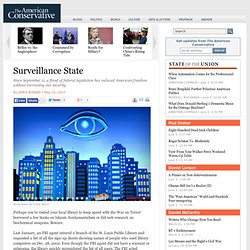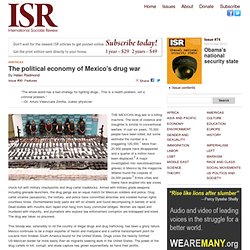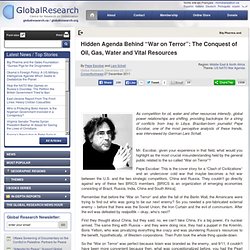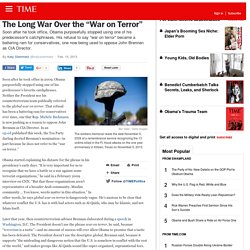

Reassembling the Republic of Letters. Surveillance State. Perhaps you’ve visited your local library to keep speed with the War on Terror: borrowed a few books on Islamic fundamentalism or did web research on biochemical weapons.

Beware. Last January, an FBI agent entered a branch of the St. Louis Public Library and requested a list of all the sign-up sheets showing names of people who used library computers on Dec. 28, 2002. Even though the FBI agent did not have a warrant or subpoena, the library quickly surrendered the list of all users. The FBI acted because someone phoned in a tip that they “smelled something strange” about a library patron of Middle Eastern descent.
Welcome to America under the Patriot Act. Last October, then House Majority Leader Dick Armey branded our own Justice Department “the biggest threat to personal liberty in the country.” Archives: President George W. Bush Speaks to HUD Employees on National Homeownership Month (6/18/02) Archives: President George W. Bush Speaks to HUD Employees on National Homeownership Month (6/18/02) International Affairs (Royal Institute of International Affairs 1944-), Vol. 84, No. 2 (Mar., 2008), pp. 191-209. Americans Are Living In 1984. The White House’s “death of bin Laden” story has come apart at the seams.

Will it make any difference that before 48 hours had passed the story had changed so much that it no longer bore any resemblance to President Obama’s Sunday evening broadcast and has lost all credibility? So far it has made no difference to the once-fabled news organization, the British Broadcasting Corporation (BBC), which on May 9, eight days later, is still repeating the propaganda that the SEALs killed bin Laden in his Pakistani compound, where bin Laden lived next door to the Pakistani Military Academy surrounded by the Pakistani army. Not even the president of Pakistan finds the story implausible. The BBC reports that the president is launching a full-scale investigation of how bin Laden managed to live for years in an army garrison town without being noticed. For most Americans the story began and ended with four words: “we got bin Laden.” Everyone knows we killed bin Laden. The 'War on Terror' as Defined by 1984's Emmanuel Goldstein. The political economy of Mexico's drug war.
THE MEXICAN drug war is a killing machine.

The level of violence and slaughter is similar to conventional warfare. In just six years, 70,000 people have been killed, but some estimate the number is a staggering 120,000.1 More than 20,000 people have disappeared and a quarter of a million have been displaced.2 A major investigation into narcofosas(mass graves) in Mexico by the magazine Milenio found the corpses of 24,000 people.3 Entire cities and towns have erupted into war zones chock-full with military checkpoints and drug cartel roadblocks.
Armed with military grade weapons including grenade launchers, the drug gangs are an equal match for Mexican soldiers and police. Drug cartel sicarios (assassins), the military, and police have committed atrocities and violated human rights countless times. Dismembered body parts are left on streets and found decomposing in barrels of acid. Former president Felipe Calderón unleashed la guerra contra las drogas upon his inauguration in 2006. The North American Review, Vol. 153, No. 421 (Dec., 1891), pp. 672-683.
Hidden Agenda Behind “War on Terror”: The Conquest of Oil, Gas, Water and Vital Resources. As competition for oil, water and other resources intensify, global power relationships are shifting, providing backdrops for a string of conflicts from Iraq to Libya.

Brazilian-born journalist Pepe Escobar, one of the most perceptive analysts of these trends, was interviewed by German Lars Schall. Mr. Escobar, given your experience in that field, what would you highlight as the most crucial misunderstanding held by the general public related to the so called “War on Terror”? Pepe Escobar: This is the cover story for a “Clash of Civilizations“ and an undercover cold war that maybe becomes a hot war between the U.S. and the two strategic competitors, China and Russia. They couldn’t go directly against any of these two BRICS members. The Long War Over the “War on Terror” Soon after he took office in 2009, Obama purposefully stopped using one of his predecessor’s favorite catchphrases.

Neither the President nor his counterterrorism team publically referred to the global war on terror. That refusal has been a battering ram for conservatives ever since, one that Rep. Michele Bachmann is now pushing as a reason to oppose John Brennan as CIA Director. In an op-ed published this week, the Tea Party darling decried Brennan’s nomination—in part because he does not refer to the “war on terror.” Obama started explaining his distaste for the phrase in his presidency’s early days. Later that year, then counterterrorism advisor Brennan elaborated during a speech in Washington, D.C. Critics such as Bachmann paint opposition to the phrase as a mistakenly narrow focus on Al-Qaida. Defining the Enemy: Myth and Representation in the War on Terror.